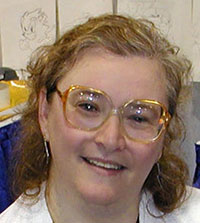ELAYNE RIGGS: My life with Lulu
 Back when my ex-husband and I were first getting heavily involved in online comics fandom and attending lots of conventions, there weren’t a lot of women con-goers, so we all tended to stand out a bit and more or less gravitate towards one another. As I recall there weren’t a lot of "booth babes" in those days, so the women con-goers consisted mostly of either readers (what we would call "fangirls" today but which term hadn’t even come into vogue by that point) or comics creators’ spouses, with the very occasional industry pro like Colleen Doran and Maggie Thompson and Heidi MacDonald.
Back when my ex-husband and I were first getting heavily involved in online comics fandom and attending lots of conventions, there weren’t a lot of women con-goers, so we all tended to stand out a bit and more or less gravitate towards one another. As I recall there weren’t a lot of "booth babes" in those days, so the women con-goers consisted mostly of either readers (what we would call "fangirls" today but which term hadn’t even come into vogue by that point) or comics creators’ spouses, with the very occasional industry pro like Colleen Doran and Maggie Thompson and Heidi MacDonald.
As I was an avid reader with professional writing aspirations, I fit the first category but hoped to also fit the last — that I’d wind up in the second as well I could not have foreseen — and as most of the active industry pros seemed to be around my age and I’d already "met" so many of them online, that’s where I hung out.
And that’s where I first heard about a new organization called Friends of Lulu, named in honor of the comics character created by Marge Henderson Buell, which Heidi and a few others had conceived of at the 1993 San Diego convention to address the gaping chasm between women’s status in comics and that of their male colleagues. I’d been an active feminist since college, and the idea of a comics industry group formed to redress injustice and give visibility to the marginalized appealed to me.
At the time, the internal debate amongst the founders was whether to even admit non-professionals; fortunately they decided to open an organizational gathering (and membership) to non-pros, so I attended my first FoL meeting in San Diego in 1994. Now, as many will attest, I don’t have the best memory for specifics, so what follows are mostly general recollections and feelings, supplemented by my collection of FoL member newsletters from Volume 1 #1 (June 1995) through the summer of 2004.














